In view of strengthening and capacity building in coconut production and processing, the Food and Agricultural Research and Extension Institute (FAREI) solicited the expertise of an international consultant, Dr V. Krishnakumar, former Head of ICAR-Central Plantation Crops Research Institute, Regional Station Kerala, India. Dr. V. Krishnakumar has thirty-seven years of experience in research, including eighteen years dedicated to coconut research and development. He has edited twelve books and published more than 100 research and technical articles and contributed chapters in many books and articles, both at the National and International level.
![IMG-20240426-WA0013[1] IMG-20240426-WA0013[1]](https://farei.mu/farei2021/wp-content/uploads/elementor/thumbs/IMG-20240426-WA00131-qqibjhhymnpp4ag443x31etlevgsf5a9epp3cbwrcg.jpg)
Dr. V. Krishnakumar visited Mauritius from 15th to 27th April 2024 in order to provide training on sustainable coconut production, coconut variety identification, post-harvest practices, coconut waste valorisation, coconut processing and value addition. A total of thirty eight participants comprising of staff from FAREI, staff of Ministry of Agro-Industry and Food Security (MAIFS), staff of Outer Islands Development Corporation (OIDC), as well as entrepreneurs and growers attended the training programmes.
On 16th April 2024, Dr. V. Krishnakumar, accompanied by officers of Fruit Research Division of FAREI, visited Plaisance Model Farm of FAREI, Plaisance Experiment Station of MAIFS and various coconut growers to acquaint himself with the cultivation practices and local coconut varieties present on the island.
![IMG-20240416-WA0006[1] IMG-20240416-WA0006[1]](https://farei.mu/farei2021/wp-content/uploads/elementor/thumbs/IMG-20240416-WA00061-qqibia9dwa1dd1icgfvbsi2dbghi1ak8psp37omx7k.jpg)
![IMG-20240427-WA0020[1] IMG-20240427-WA0020[1]](https://farei.mu/farei2021/wp-content/uploads/elementor/thumbs/IMG-20240427-WA00201-qqibjl9bdztphjm2u06o967f0q1uq5qtk9bd7ip8kg.jpg)
Fig 2.0 Field visit to coconut growers and entrepreneurs
![IMG-20240603-WA0006[1] IMG-20240603-WA0006[1]](https://farei.mu/farei2021/wp-content/uploads/elementor/thumbs/IMG-20240603-WA00061-qqibjqwcj01ff7dvx2mfo4s6l1a20cd7l18a36gvj4.jpg)
Fig 3.0 Identification of local coconut varieties
From 17th to 19th April 2024, a total of 29 participants attended a training lecture programme on coconut at FAREI St Pierre, consisting of officers from scientific, technical and managerial field as well as coconut farmers and entrepreneurs. The training comprised mainly of interactive PowerPoint lectures together with video presentations on global coconut scenario, planting material production, plantation management and aftercare, coconut varieties and hybrids released by the ICAR-Central Plantation Crops Research Institute (CPCRI), cropping systems, pest and disease management, harvest equipment, post-harvest management practices, and coconut waste valorisation.
![IMG-20240419-WA0008[1] IMG-20240419-WA0008[1]](https://farei.mu/farei2021/wp-content/uploads/elementor/thumbs/IMG-20240419-WA00081-qqibinf4jyjdvkz8blk3reqtmuon120hfltvxk3esg.jpg)
![IMG-20240417-WA0026[1] IMG-20240417-WA0026[1]](https://farei.mu/farei2021/wp-content/uploads/elementor/thumbs/IMG-20240417-WA00261-qqibihs3eybnxx7f8j4ccg622jgfqve3etwz1wbrts.jpg)
From 23rd to 26th April 2024, eighteen participants from the scientific, technical and managerial fields, along with auxiliary staff of FAREI, coconut farmers and entrepreneurs attended a hands-on demonstration programme at Wooton Crop Research Station of FAREI during which Dr. Krishnakumar shared his expertise on the processing and value addition of coconut products, as practiced in ICAR-CPCRI laboratories and research centres.
![IMG-20240423-WA0006[1] IMG-20240423-WA0006[1]](https://farei.mu/farei2021/wp-content/uploads/elementor/thumbs/IMG-20240423-WA00061-qqibiq8n4gn8uev4v4rzgw17f0aqo5bofzscddz89s.jpg)
![IMG-20240424-WA0007[1] IMG-20240424-WA0007[1]](https://farei.mu/farei2021/wp-content/uploads/elementor/thumbs/IMG-20240424-WA00071-qqibit25oyr3t8r1enzv6dbl75wub8mvgdqst7v1r4.jpg)
![IMG-20240425-WA0049[1] IMG-20240425-WA0049[1]](https://farei.mu/farei2021/wp-content/uploads/elementor/thumbs/IMG-20240425-WA00491-qqibj4c7yz6jokanksve0ah4bsd8vlvnhxkmkjebog.jpg)
Fig 7.0 Hands -on practical sessions on coconut processing
The following are some of the products made upon consultant’s instructions:
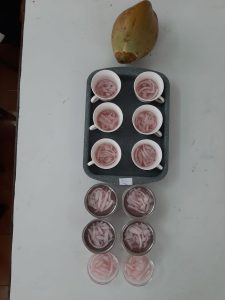
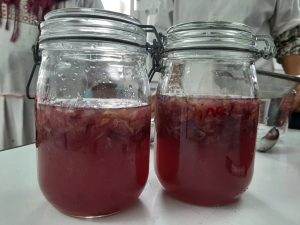
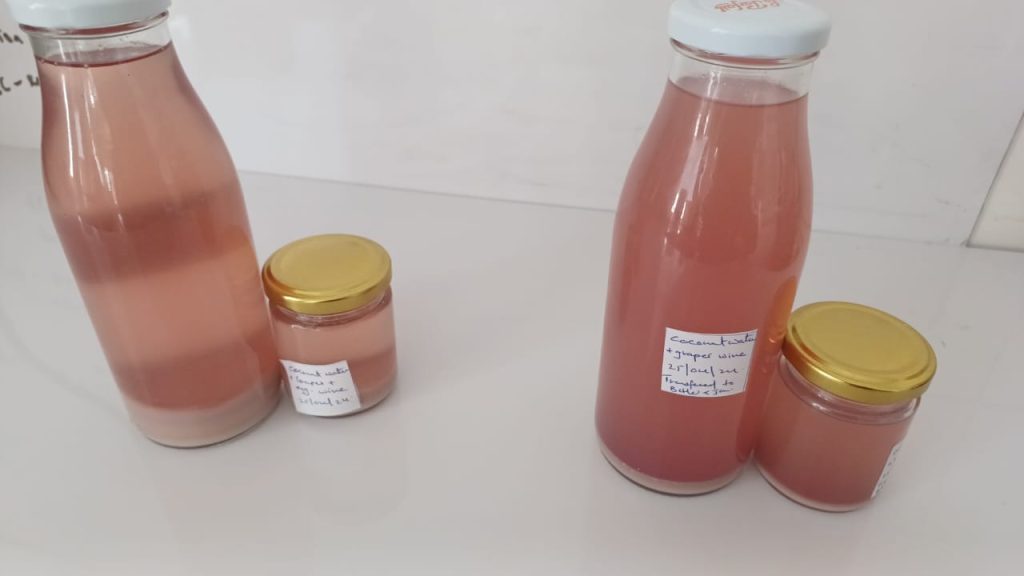
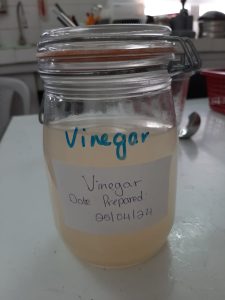
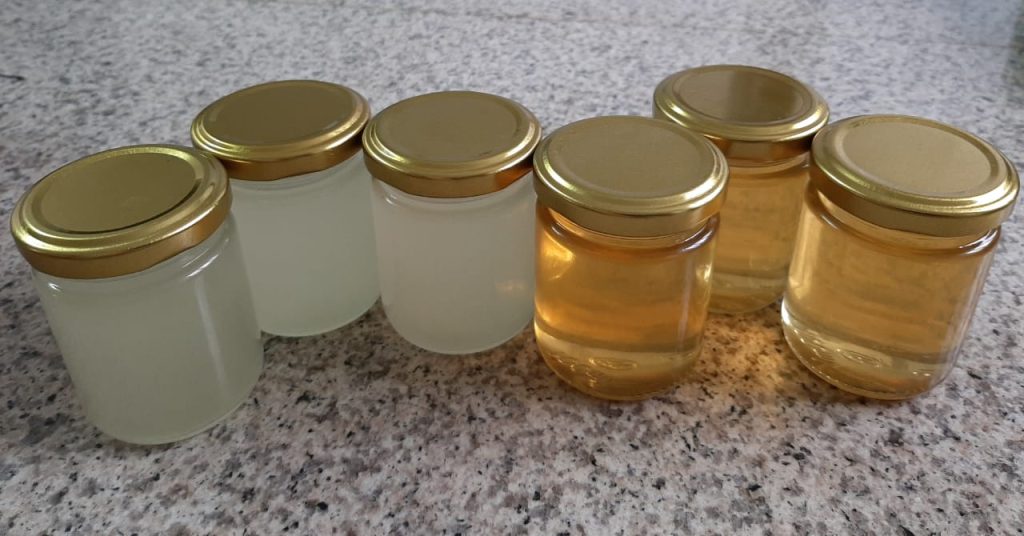
During the lectures and practical sessions, participants gained knowledge on coconut production, post-harvest practices and production of edible products such as coconut vinegar, squash and jelly, coconut wine, coconut sugar, coconut water storage techniques and virgin coconut oil. They also learned about non-edible products like making of compost from coir pith and coconut leaves, activated charcoal and coco-peat using coconut as a by-product. These products have immense marketing potential and expected to significantly boost the Mauritian economy through sales, attaining self-sufficiency, and generating employment.
